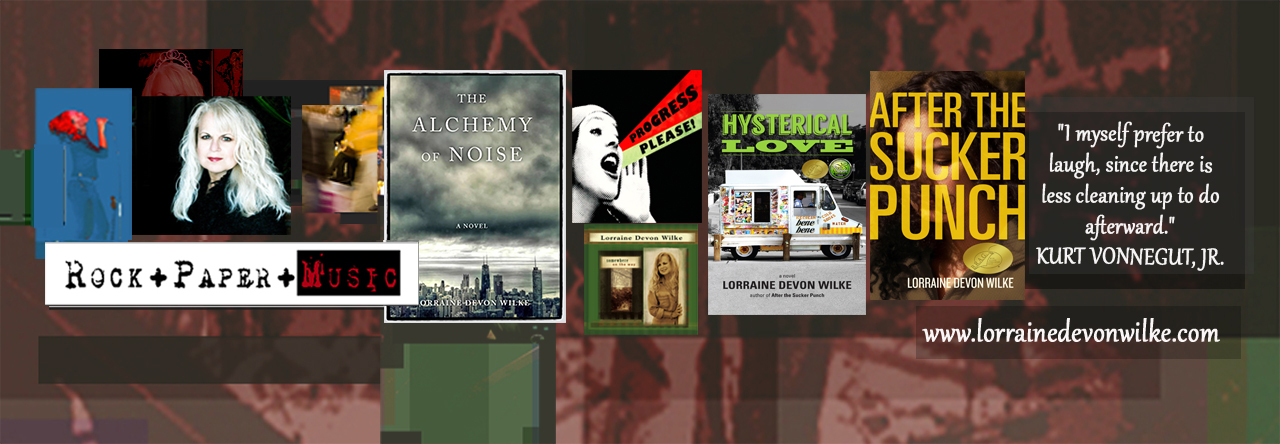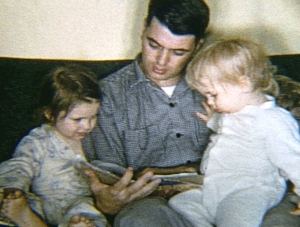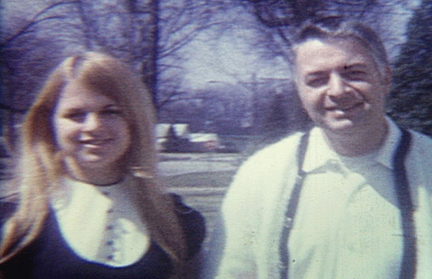After mentioning the 31st anniversary of my husband’s and my first date (Disneyland: he fell in love on Splash Mountain, for me it was his hand on my forehead after Star Tours queasiness), an interviewer marveled at the longevity of my marriage and asked: “How’d you do it? What advice do you have?”, making me feel like a 100-year-old woman with “wisdoms.” But still, I appreciated the awe and wonder because I remember feeling just as awestruck around long-marrieds back before I figured it out/got lucky myself. So I decided to honor her query with the reply that follows. And it’s just that: my reply, my experience. We all have different journeys, theories, and views, so take this for what it is and if/how it may inspire you.

When I was charging headlong into my early adulthood with all its intoxicating freedoms, particularly around the mating rituals of the young and libidinous, I arrived at that inevitable rite-of-passage fully and completely unarmed, lacking useful (any?) parental guidance, and boomeranging off religious repression that had overwhelmed my personal and sexual development.
See, my parents were so busy keeping me from sex I was never taught anything about it, other than to avoid it at the hideous cost of my eternal damnation. Which, when you’re a reasonably attractive, wildly hormonal young person faced with the reality of BOYS (or GIRLS, as the case may be), even threats of endless inferno hold no sway. But the problem is without guidance, without meaningful comprehension of the intricacies and nuances of how to approach and manage this seminal arena of life, it’s too easy to develop bad habits, move forward with misconceptions and rules that don’t always apply and can lead down thorny roads of heartache, breakups, and, when you’re all grown up, divorce.
I know. I’ve been there. Lots of heartache, bad boyfriends, really lousy choices, and far too many relationships that should have never happened in the first place. No divorces, but only because I didn’t marry any of them. Had I married any of them there would have been divorces. I at least had the good sense to know that marriage was to be avoided until I figured it out, which, in my case, required the tutelage of much life experience and excellent therapy. By the time I met the man who was to become my husband, we were lucky enough to have both learned the secret:
Active choosing.
If you want a partner (as opposed to an undefined whatever let’s just see how it goes thing), it’s about actively choosing someone… someone who’s not just sexy, fun, and with whom you have astonishing chemistry, but who’ll actually be a good partner. It’s how to determine that that’s the kicker.
Because what we’ve been mistakenly told, either literally or via cultural osmosis, is that when we meet someone, when we embark upon the beginning stages of a relationship, there are “rules” that preclude any kind of real due diligence: We are to be cool, not demand too much, reveal too much, make him or her feel there are any expectations of them. Don’t share too much or ask too many questions—that might overwhelm them. Certainly don’t attempt to ascertain “where we might go from here” any time soon. Act interested but not too interested, available but not too; desirous but not slutty; just go with the flow and let it all reveal itself. If you see things you don’t like, presume those things will get better as your relationship evolves. Have standards but not too high. As long as there’s chemistry, you’re good to go. Right?
Not always. Often not. In fact, 50% of the time not. Because, despite the very real delights of early-relationship fun, you lack information. Foundational information. The kind you need to smartly assess future potential. And no matter what modern culture or “dating rules” would have you believe, there’s only one way to get it before you’re too entrenched:
ASK.
Ask LOTS of candid, specific questions that require answers, then determine the truthfulness of those answers. Discuss. Debate. Don’t hide who you are, don’t hold back who you are. Don’t not eat when you go to a restaurant. Assess the “here and now” reality of the person in front of you with absolute awareness that what they are, here and now, is the essence of what they’ll likely always be, and determine if that’s compatible with your own here and now.
And that’s just a start.
Look, I know how exhilarating it is to be swept up in the heat of passion, the allure of “new person” appeal, no questions asked. You revel in the excitement of discovery, the hope of potential, the envisioned evolution of what might, might, come to be, confident you’ll figure out all the kinks, quirks, and questions along the way. Just go for the ride and let it take you where it will.
Yes. So fun. Until you discover he has rather startling anger issues. She doesn’t think she ever wants kids. He’s a bottle-a-night drinker. In her eyes, commitment is overrated. He turns out to be really boring past the initial hot period. She’s had three bankruptcies. He struggles to hold a job. She hates dogs. He wears a red hat. She never votes. Etc.
What I learned in my long and storied relationship career is that too often by the time I figured out the person I’d become enraptured by was fatally flawed and oh-so-wrong for me, I was already in DEEP, emotionally invested, heart, soul, hopes, and dreams. Doing something about it at that point is… challenging. Decisions are made then quickly reversed. Boundaries are set, then easily violated. Promises asserted, apologies offered, change assured, then it all swings back to the chronic state of the relationship, which, if you’d taken the time to “look before you leapt” (as my mother used to say), you would have known he/she was a bad choice. What follows then is the universally devastating process of breaking up… which is always hard to do.
While I can count a couple of decent relationships in my  younger years, those happened almost by accident. Because it was never about me actively choosing, it was typically about me responding (“Someone likes me, he really likes me… I’m in!”). Then I hit thirty and noticed this wasn’t working and, dead-weary of the repetitive recovery demanded of each breakup, I got into therapy to hopefully figure it out. Now, I’m not pushing therapy, but given my deficit of parental guidance, I needed guidance from somewhere and my very wise therapist provided the forum in which I could learn. And I did.
younger years, those happened almost by accident. Because it was never about me actively choosing, it was typically about me responding (“Someone likes me, he really likes me… I’m in!”). Then I hit thirty and noticed this wasn’t working and, dead-weary of the repetitive recovery demanded of each breakup, I got into therapy to hopefully figure it out. Now, I’m not pushing therapy, but given my deficit of parental guidance, I needed guidance from somewhere and my very wise therapist provided the forum in which I could learn. And I did.
By the time I went on that date to Disneyland, I had a wealth of confidence and knowledge that gave me tools to approach that relationship differently. My new, self-preserving attitude set the stage: I was unwilling to be delicate and cautious out of fear of rejection, unwilling to invest without proper knowledge; unwilling to prioritize “dating rules” at the expense of honest due diligence. So just days after Disneyland, within the very first week of our relationship, I nervously told him I needed to clarify some essential things, he agreed, and I fired away.
Now, you’ll have your own questions, but this was the basic list I asked and he answered, not necessarily in this order:
- Are you looking for a committed relationship?
- Are you open to marrying again (he’d been married before)?
- Do you want another child (he already had one)? How many?
- What are your politics and are you politically active?
- What is your attitude about race, racism, diversity, and immigration?
- What are your thoughts regarding LGBTQ issues?
- Do you have a drinking/drug problem?
- Are you a healthy eater?
- Do you like to travel?
- What are your attitudes about money, saving, spending, sharing?
- What’s your philosophy about truthfulness; do you lie?
- What’s the status of your relationship with your family?
- Have you ever been verbally, emotionally, or physically abusive…EVER?
- What is your attitude about guns—ownership, laws, controls?
- What are your views on religion, spirituality, etc.?
And so on…
It’s likely we were not as organized as this list implies—and, no, I didn’t have it written out at the time, I just knew what my priorities were. And it wasn’t easy, I felt squeamish; at times I could see he was surprised by my candor, but I’d reached a time in my life where I was not going to invest in another relationship without enough information. We literally talked for hours, because once we got through my list, he had his own, which was largely a version of mine from the male perspective. It was exhausting. And exhilarating.
But know that, brave though you may be to commit to this exercise, you go in aware you might get to the end of it only to realize you really aren’t as compatible as hoped, and quite honestly shouldn’t waste each other’s time when the conclusion is clearly foregone. But still, the List is a gift, because you’ll have figured that out before investing weeks, months, years into a relationship that won’t, ultimately, succeed.
In our case, we didn’t scare each other off, we didn’t implode, we didn’t “ruin the romance” or run screaming into the night. We learned what we needed to know and, in the act of asking and answering, created intimacy, got to understand each other, so well that the magical state-of-being long-marrieds always tell you happens—“you just know”—happened. We just knew. I remembered thinking: “Oh, this is the kind of guy you marry!”, realizing the reason I hadn’t “just known” before was that I hadn’t been with anyone I should have married.
And so we did. Eight months later and now over 30 years.
But trust me, we aren’t magical. It hasn’t all been smooth sailing. As with any relationship, particularly a longterm one, we’ve hit some unforeseen bumps along the way, some significant. I won’t pretend we’re preternaturally transcendent “relationship experts”; we’re not. But it is true that the solid foundation we began building after we got back from Disneyland and sat around my house with our lists was the glue that ultimately held us together. It was very good glue.
So, dear interviewer, that’s my “secret,” my advice. Do with it what you will. Or don’t. It’s all so personal. If you’re just looking for fun with someone who makes you laugh and gets your pheromones tingling, go for it, Devil may care, caution to the wind, however long it lasts. But if you seek a relationship that might have the potential of future, revel in pheromones, sure, but also ASK. Everything. All things. Every single little question you might have. If you scare him or her off, trust that it wasn’t the right relationship for you. But I promise, if you honestly and authentically get through your lists and discover there is reason to proceed, you will have put yourself in the best possible place for all the good that follows.
Photo 1 by Korney Violin on Unsplash; Photo 2 by Charles Deluvio on Unsplash

Visit www.lorrainedevonwilke.com for details and links to LDW’s books, music, photography, and articles.














 So I’ve been Netflixing the series and, I have to say, it is a fascinating snapshot of a historical time teetering on the brink of explosion. It well depicts the era’s style and panache (now called “mid century”), and paints a clever and sometimes unsettling anthropological thumbnail of human nature at a point when society was remarkably different. While it focuses mainly on only one or two class sub-sets, it does a good job of breathing life into the anachronistic “swells” and “dolls” of the jargon, the girdles and slicked back hair, and the propensity for unrestrained smoking and drinking (after watching several episodes I felt both asthmatic and buzzed!). But what it illustrates most pointedly is the distance we’ve come in our gender politics.
So I’ve been Netflixing the series and, I have to say, it is a fascinating snapshot of a historical time teetering on the brink of explosion. It well depicts the era’s style and panache (now called “mid century”), and paints a clever and sometimes unsettling anthropological thumbnail of human nature at a point when society was remarkably different. While it focuses mainly on only one or two class sub-sets, it does a good job of breathing life into the anachronistic “swells” and “dolls” of the jargon, the girdles and slicked back hair, and the propensity for unrestrained smoking and drinking (after watching several episodes I felt both asthmatic and buzzed!). But what it illustrates most pointedly is the distance we’ve come in our gender politics.
 In families that have them? Very essential. It’s not whether families can survive without a father – they can, that is well documented. It’s whether a family that has a father has one that is fully present, involved, and contributing in the most effective ways possible for a child’s best shot at success.
In families that have them? Very essential. It’s not whether families can survive without a father – they can, that is well documented. It’s whether a family that has a father has one that is fully present, involved, and contributing in the most effective ways possible for a child’s best shot at success. It’s a big responsibility, no doubt about it. We have come a long way from the Mad Men who saw their children as so many props, but new eras bring new problems and in a world where too many young men advance into adulthood needing anger management skills, a better understanding of how to be strong without being a bully, and a clearer sense of the purpose of honor and integrity, a father’s work is cut out for him. When a daughter sublimates herself in her relationships with men, loses her sense of confidence in the face of career adversity, or can’t determine how strong a woman to be without losing appeal, she clearly needs wise fathering to help reconstruct her perspective.
It’s a big responsibility, no doubt about it. We have come a long way from the Mad Men who saw their children as so many props, but new eras bring new problems and in a world where too many young men advance into adulthood needing anger management skills, a better understanding of how to be strong without being a bully, and a clearer sense of the purpose of honor and integrity, a father’s work is cut out for him. When a daughter sublimates herself in her relationships with men, loses her sense of confidence in the face of career adversity, or can’t determine how strong a woman to be without losing appeal, she clearly needs wise fathering to help reconstruct her perspective.












